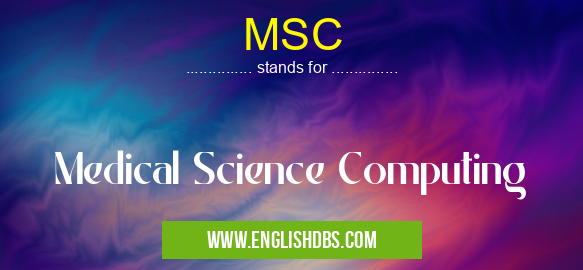What does MSC mean in ACADEMIC & SCIENCE
MSC stands for Medical Science Computing. It is a field that combines medical science with computer science to develop and apply computational tools and techniques to healthcare. MSC professionals use their knowledge of both disciplines to solve problems in the medical field and improve patient care.

MSC meaning in Academic & Science in Academic & Science
MSC mostly used in an acronym Academic & Science in Category Academic & Science that means Medical Science Computing
Shorthand: MSC,
Full Form: Medical Science Computing
For more information of "Medical Science Computing", see the section below.
Areas of MSC
MSC encompasses a wide range of areas, including:
- Bioinformatics: The use of computer science to analyze and interpret biological data.
- Medical Imaging: The development and use of imaging technologies for medical diagnosis and treatment.
- Clinical Decision Support Systems: Computer systems that help healthcare professionals make informed decisions about patient care.
- Telemedicine: The use of technology to provide healthcare services remotely.
- Health Informatics: The management and analysis of health data to improve patient outcomes and population health.
Applications of MSC
MSC has numerous applications in the healthcare industry, such as:
- Drug Discovery and Development: Using computational methods to design and test new drugs.
- Personalized Medicine: Tailoring medical treatments to individual patients based on their genetic and other data.
- Disease Diagnosis and Prognosis: Developing algorithms to identify and predict the progression of diseases.
- Healthcare Delivery Optimization: Improving the efficiency and effectiveness of healthcare systems through technology.
- Health Education and Outreach: Using computer-based tools to educate patients and the public about health issues.
Essential Questions and Answers on Medical Science Computing in "SCIENCE»SCIENCE"
What is Medical Science Computing (MSC)?
Medical Science Computing (MSC) is an interdisciplinary field that combines medical science, computer science, and engineering to develop and apply computational tools and technologies to solve problems in healthcare and medicine.
What are the key areas of research in MSC?
Key research areas in MSC include medical imaging, clinical decision support systems, bioinformatics, personalized medicine, and wearable technologies.
What are the applications of MSC in healthcare?
MSC has wide-ranging applications in healthcare, including:
- Diagnosis and treatment planning using medical imaging
- Prediction and prevention of diseases using clinical decision support systems
- Development of new drugs and therapies using bioinformatics
- Tailored treatments for individual patients using personalized medicine
- Remote patient monitoring and disease management using wearable technologies
What are the benefits of using MSC in healthcare?
Benefits of using MSC in healthcare include:
- Improved accuracy and efficiency in diagnosis and treatment
- Reduced costs and improved patient outcomes
- Greater access to healthcare services
- Personalized and tailored treatments
- Enhanced patient engagement and empowerment
What are the challenges in implementing MSC in healthcare?
Challenges in implementing MSC in healthcare include:
- Data security and privacy concerns
- Integration with existing healthcare systems
- Resistance to change from clinicians and patients
- Scalability and sustainability of solutions
What is the future of MSC in healthcare?
MSC is expected to play an increasingly vital role in healthcare in the future, with advances in artificial intelligence, machine learning, and cloud computing driving new innovations and applications.
Final Words: MSC is a rapidly growing field that is having a significant impact on healthcare. By combining medical science with computer science, MSC professionals are developing innovative solutions to address challenges in the healthcare system and improve patient outcomes.
MSC also stands for: |
|
| All stands for MSC |
